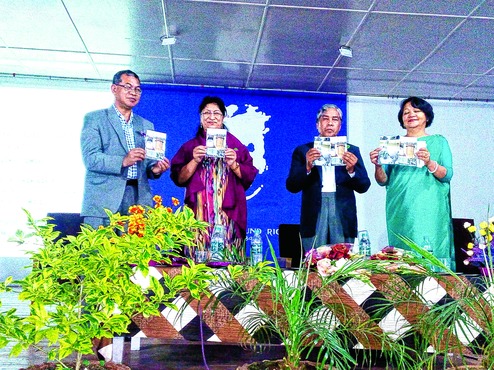
Shillong, May 8: Over a century after World War I, a book on the role of the Khasi Labour Corps, which went to assist the British forces during the war in France, was released here today.
The Role of the Khasi Labour Corps During First World War is authored by Sylvanus Lamare, principal of St Edmunds' College, Shillong, who took nearly five years to complete the book.
The author went through archival materials recorded in books at different places.
World War I, that broke out in Europe between Germany and the Allied powers, lasted from July 28, 1914 to November 11, 1918.
The 96-page book was released by minister for higher and technical education Roshan Warjri at St Edmund's College here in the presence of eminent writers, teachers and students.
Stating that war is not an event to celebrate, Lamare, however, said he came out with the book to keep memories of the Khasi men, who participated in the war in France, alive.
The book mentioned that the Khasi Labour Corps was initially known as the 26th Khasi Labour Corps, but later it was divided into four companies - 22nd, 34th, 55th, and 56th - with around 500 men in each company.
Herbert Cunningham Clougston and F.B. Wilkins were the European officers of the corps. David Stephen Davies, a Presbyterian missionary and Rev. Shai Rabooh, a Khasi preacher, accompanied the corps to France.
But no proper records could be traced to find out the exact number of Khasi men who had gone to the war, and only a few names of those who died were inscribed on the two memorial stones at Shillong and Jowai in Jaintia hills.
Lamare said some records available with the British government suggested that thousands of Khasi men who participated in the war died as part of the British force in France between 1914 and 1918.
"While many died in France during the war, only 30 Khasi men returned home. So far, I have been able to trace descendants of two members of Khasi Labour Corps - one from Kharkongor clan of Lawjynriew in Shillong and the other belonged to Suchiang clan from Shangpung village in Jaintia hills," he said.
Lamare also included in the book a song sung by the Khasi Labour Corps from Jaintia hills before leaving for France. The song was handed over to Lamare by Prof. Wandell Passah, former head of the electronics department, St Edmund's College.
In the book, names of over a hundred Khasi Labour Corps soldiers, hailing from both Khasi and Jaintia regions, as well as names of some non-Khasis, were mentioned.
To remember their sacrifice, two memorial stones, known as Mot Phran (memorial stones from France), were set up in Shillong and Jowai in Jaintia hills bearing names of those who died inscribed on the stones.
While the memorial stone at Iewduh, the main market in the heart of Shillong, was built by the British and inaugurated in 1924, the one at Jowai was built by the traditional chiefs in Jaintia region known as doloi.
While the Garo Labour Corps who also went to France are remembered every year in Garo hills, no such day is organised to remember the Khasi Labour Corps either in Shillong or Jowai.
Asked about the date for remembering the Khasi men who died in France, Lamare suggested formation of a committee of historians.
"The Khasi men died on different dates. I feel that June 28 should be the day for remembering them since the Treaty of Versailles was signed on June 28, 1919, that brought the World War I to an end," Lamare said.
He said he would translate the book into Khasi and continue his research.










